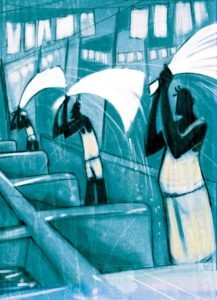This post has been written by Mamta Kumari, a law student from Banasthali Vidyapith.
Case Title: Vinod Kumar Kanojia v. Union of India and ors.
Date of decision: 22nd September, 2010
Court: High Court of Delhi
Writ petition no.: 6302/2010
Judges: Dipak Mishra, Mr. Manmohan
Parties: petitioner- Vinod Kumar Kanojia
Respondents -Union of India and ors.
Lawyers: Petitioner– Ajay Kumar Bhatia
Respondent– A.S. Chandhoik
FACTS OF THE CASE
Public Interest Litigation has been filed by Vinod Kumar Kanojia on behalf of Hindustan Kanojia Organization, a Dhobi community, schedule caste in India.
The petition has been filed after knowing from a news item published in Amar Ujala on 20th July,2010 that a film in the name of ‘DHOBI GHAT’ in going to be released in December,2010.
In the petition, has been filed on the ground, that the name kept for the film is affecting the sensitivity and sentiments of the Dhobi community which created the dent in the feelings of people of the [articular caste.
Contention from the Petitioner’s counsel
Counsel of the petitioner contended that the storyline of the film do not revolve around the title used as Dhobi Ghat and the use of this word is an insult to the Schedule Caste and affected the feelings of persons belonging to the said community and for the said contention the counsel referred the long history of depressed class and how they are being treated since long time.
He also contended that the name of the film Dhobi ghat is violative of Section 3(1)(x) of the Scheduled Caste and the Scheduled Tribes (Prevention of Atrocities) Act,1989 which states that any person who is not a part of Scheduled Caste and Scheduled Tribes-
“intentionally insults or intimidates a member of Scheduled Caste or a Scheduled Tribes in any place within a public view”.
shall be punishable for the offence under the Act. Further counsel claimed that the community is notified by the Constitution of India as Schedule Caste and calling any person with this name is a punishable offence.
The Counsel also recommended the decision of Swarna Singh and ors. V. State and another [2]in which he referred various point of the judgment and stated that the chamar was a stable socio-economic group before coming of Britishers in India who use to manufacture leather goods. There are different occupation in India which become caste like dhobi (washerman), Lohar (blacksmith), badhai (carpenter). Kumhar (potter) etc.
ISSUE
- Whether naming of movie of such a nature is offensive or not?
- Whether the title “Dhobi Ghat” is violative of section 3(1)(x) of SC/ST Act and affect the sensitivity of the community?
DECISION
The Bench headed by Chief Justice Dipak Mishra was of view that on reading of provision i.e. Section 3(1)(x) of the Scheduled Caste and the Scheduled Tribes (Prevention of Atrocities) Act,1989 is not violative and naming of movie of such a nature cannot be offensive to the caste. The court further states that dhobi ghat is just a geographical description of a place where cloths are washed and there is nothing to be done with the name of movie. It stated that there is no point found in referring the cases by the petitioner.
The Delhi High Court dismissed the plea which Challenged the title of film Dhobi Ghat on the ground that it offends the sensitivity of the particular community. The Court found no merit in the plea as there is no public interest found and ruled in favour of respondent in which the court ordered the petitioner to deposit the amount of Rs. 25,000. The amount shall be deposited within four weeks in the favour of Blind Relief Association situated at Lal Bahadur Shastri Marg, Near Oberoi Hotel, New Delhi.
PIL – Abuse of process of Law?
for every Public Interest litigation there has to be the existence of public interest and in this particular case the court is of opinion that there is no interest of public is found.
For this particular pint the Delhi High Court referred the case of Ashok Kumar Pandey v. State of West Bengal [3] in which the court stated that whenever any personal dispute is styled in the way of public interest litigation, should be thrown out as for being a litigation to be a PIL, there must be genuine public interest involve in it. A person must not file PIL for their personal causes as for satisfying his personal issues or enmity.
While mentioning this point the court referred Ramjas Foundation v. Union of India [4] and stated that a person who files a writ petition must come with a clean hand and clean mind. Person who acted in the bonafied manner and have sufficient public interest in the litigation will only have a locus standi.
In this particular case court stated that “Public Interest Litigation is a weapon which has to be used with great care” and in dealing with this case a lot of time was wasted, which can be used for the disposal of genuine and important cases. Also, the present case is styled as public interest litigation is filed to satisfy personal egoism and the said movie do not come in the realm of it.
The court held that the present petition is an abuse of process of law and also defeated the concept of public interest litigation filed for public good and comes under the realm of frivolous litigation.
REFERENCES
[1] Section 3(1)(x) of the Scheduled Caste and the Scheduled Tribes (Prevention of Atrocities) Act,1989
[2] (2008) 8 SCC 435
[3] (2004) 3 SCC 349
[4] AIR 1993 SC 852
http://indiankanoon.org/doc/21021742/
http://archive.indianexpress.com/news/hc-quashes-petition-against-aamirs-dhobi-ghat/685985/


